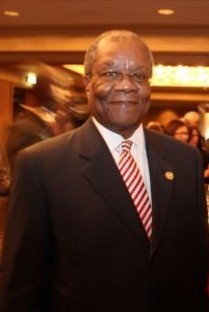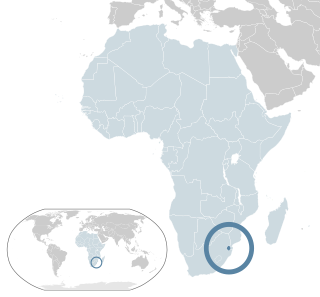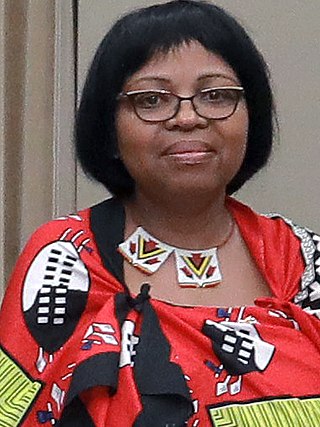Related Research Articles

Eswatini, formally the Kingdom of Eswatini and also known by its former official name Swaziland and formerly the Kingdom of Swaziland, is a landlocked country in Southern Africa. It is bordered by Mozambique to its northeast and South Africa to its north, west, south, and southeast. At no more than 200 km (120 mi) north to south and 130 km (81 mi) east to west, Eswatini is one of the smallest countries in Africa; despite this, its climate and topography are diverse, ranging from a cool and mountainous highveld to a hot and dry lowveld.
The Umbutfo Eswatini Defence Force (UEDF) is the military of the Southern African Kingdom of Eswatini (Swaziland). It is used primarily during domestic protests, with some border and customs duties; the force has never been involved in a foreign conflict. The army has struggled with high rates of HIV infection. Since measures were put in place the rate is dropping.

Artifacts indicating human activity dating back to the early Stone Age have been found in the Kingdom of Eswatini. The earliest known inhabitants of the region were Khoisan hunter-gatherers. Later, the population became predominantly Nguni during and after the great Bantu migrations. People speaking languages ancestral to the current Sotho and Nguni languages began settling no later than the 11th century. The country now derives its name from a later king named Mswati II. Mswati II was the greatest of the fighting kings of Eswatini, and he greatly extended the area of the country to twice its current size. The people of Eswatini largely belong to a number of clans that can be categorized as Emakhandzambili, Bemdzabu, and Emafikamuva, depending on when and how they settled in Eswatini.

Mbabane is the most populous city in Eswatini, and is one of the two capitals, serving as the executive capital.

Mswati III is Ngwenyama (King) of Eswatini and head of the Swazi royal family. He heads Africa’s last absolute monarchy, as he has veto power over all branches of government and is constitutionally immune from prosecution.

The Swazi or Swati are a Bantu ethnic group native to Southern Africa, inhabiting Eswatini, a sovereign kingdom in Southern Africa, and South Africa's Mpumalanga province. EmaSwati are part of the Nguni-language speaking peoples whose origins can be traced through archaeology to East Africa where similar traditions, beliefs and cultural practices are found.

Lobamba is a city in Eswatini, and is one of the two capitals, serving as the legislative, traditional, spiritual, seat of government of the Parliament of Eswatini, and Ludzidzini Royal Village, the residence of Queen Ntfombi, the Queen Mother.

Manzini is a large city in Eswatini (Swaziland), which is also the city of Eswatini's Manzini Region. The city is the country's second largest urban center behind the capital Mbabane, with a population of 110,000 (2008). It is known as "The Hub" of Eswatini and lies on the MR3 road. Eswatini's primary industrial site at Matsapha lies near the town's western border.

Prince Barnabas Sibusiso Dlamini was a Swazi politician who served as Prime Minister of Eswatini, from 1996 to 2003 and again from October 2008 to September 2018.

Lesbian, gay, bisexual, and transgender (LGBT) people in Eswatini have limited legal rights. According to Rock of Hope, a Swati LGBT advocacy group, "there is no legislation recognising LGBTIs or protecting the right to a non-heterosexual orientation and gender identity and as a result [LGBT people] cannot be open about their orientation or gender identity for fear of rejection and discrimination." Homosexuality is illegal in Eswatini, though this law is in practice unenforced. According to the 2021 Human Rights Practices Report from the US Department of State, "there has never been an arrest or prosecution for consensual same-sex conduct."
Solomon Oladele is a Nigerian football striker.

Mbabane Highlanders is an Liswati football club based in Mbabane. They have won more national titles than any other club, although their most recent league title was in 2001.

Sipho Jele was a member of the banned Swazi political party People's United Democratic Movement (Pudemo) as well as the Swaziland Agricultural and Plantations Workers Union (SAPWU), part of the Swaziland Federation of Trade Unions (SFTU). He died in police custody in Swaziland, after having been arrested on 1 May 2010, at the SFTU May Day celebrations, for having worn a T-shirt with a Pudemo logo. Sipho Jele was found hanging from the rafters of a toilet at the Sidvwashini Correctional facility where he was being held on 4 May.

Moneni Pirates FC is a Eswatinii soccer club based in Manzini. They play in the top division in Swazi football. The team plays in white and black colors.
laNgolotsheni (Lomawa) Ndwandwe was the Ndlovukati of Swaziland, the wife of King Ngwane V, and the mother of King Sobhuza II.
Swazi Airways was a Swazi airline based at King Mswati III International Airport in Manzini. It is the successor to Royal Swazi National Airways and is fully owned by the Swaziland Government. The airline had stated in September 2016 that it would commence flights in November, flying from Manzini to destinations in South Africa and Zimbabwe. It was closed down in July 2017.

Tatenda Mandaza, known professionally as Tendaness, is a Swazi-born record producer, DJ and songwriter.
Sarah Mkhonza is a Swazi writer, educator and women's rights activist living in the United States.

Eswatini–India relations refers to the international relations that exist between Eswatini and India. India also maintains a resident High Commission in Mbabane established on 13 August, 2019. Eswatini does not have a diplomatic mission in India.

Tsandzile Dlamini is a princess of Eswatini who served as Minister of Home Affairs from 2013 to 2018.
References
- ↑ Books by Modison Salayedvwa Magagula, GetTextbooks. Retrieved 27 March 2024
- 1 2 3 4 Gikandi, Simon (2003). Encyclopedia of African literature. Taylor & Francis. p. 425. ISBN 0-415-23019-5.
- ↑ Dlamini, Zweli Martin (2009-09-26), "Kudliw' Inhloko Majaha, Esangweni!", The Swazi Observer , retrieved 2010-01-06
- ↑ Shabangu, Simon (2008-12-22), "SNCAC honours Modison Magagula", The Swazi Observer , retrieved 2010-01-06